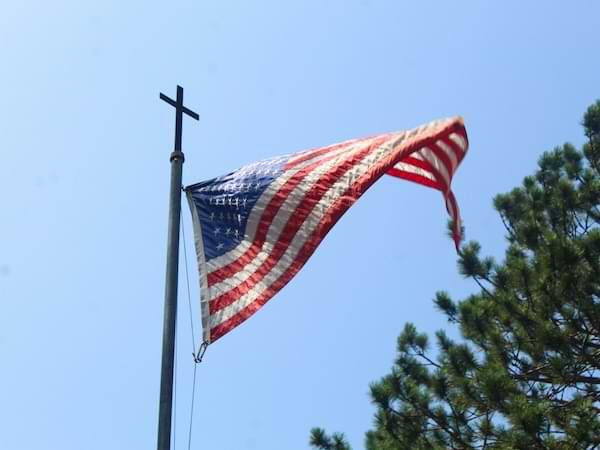Our history as one nation under God
Ronald Reagan was speaking at a Dallas Prayer Breakfast in 1984 when he remarked, “If we ever forget that we are One Nation Under God, then we will be a nation gone under.” I’m admittedly a huge fan of Ronald Reagan. Last year, I enjoyed reading That Printer of Udell’s, the book Reagan said changed his life. Like anyone, he wasn’t perfect but genuinely tried to be his best.
So much of Reagan’s character was a product of his own journey with God. He was a natural leader and gifted in his ability to craft the words he spoke. The quote above is a good example of that. I often wonder about, and look for, the next Reagan who will lead our country with great strength and an effort to aim at godly morality.
Reagan was the president who most influenced and shaped my political opinions about who should or shouldn’t be our country’s leader. There have been many imperfect presidents in our history whom I would have been proud to vote for.
Thomas Jefferson
Jefferson is an interesting man, and I have wondered if he were to run for president today, would he be elected? He, like Reagan, was a wordsmith with a persuasive personality. His personality and character were problematic in those early years, and he likely would never have survived today’s media scrutiny. Nevertheless, it’s difficult to imagine what our Constitution would sound like if it had been written by someone else.
It was utterly necessary for people who had to use a quill, ink, and parchment paper to give great thought to their words before writing them down. They had no easy way to delete anything from a piece of parchment; therefore, the words were so often profound in their depth of thought.
It was Thomas Jefferson who penned, “We hold these truths to be self-evident: that all men are created equal; that they are endowed by their Creator with certain unalienable rights; that among these are life, liberty, and the pursuit of happiness.”
If we carefully consider Jefferson’s words, we can learn much about the thoughts that formed the essential doctrines of America’s foundational beliefs.
- Truth should be self-evident.
- All people are created equal, even though people are not the same.
- There is a Creator who has created us with certain unalienable rights.
- Everyone created has the right to live their life.
- Everyone created has the freedom to make choices in life.
- Everyone created has the right to pursue happiness.
God created us in his image with the freedom to make choices. Then, God gave us his word, the truth, so we could make the right choices as we pursue our freedoms. The truths of God’s word become self-evident when we submit ourselves to our Creator’s laws and lessons.
Thomas Jefferson was a great mind and politician, but in many ways, not a great man by today’s standards. He would most likely not have been elected in today’s political climate. However, Americans would have missed a lot if we hadn’t listened to Thomas Jefferson.
John Adams
John Adams and Thomas Jefferson were close friends who worked together to create the founding principles of America’s Declaration of Independence. They were lifelong friends who held one another in high regard but had strong political disagreements. Did you know that they went a full decade at one point without speaking to one another?
An interesting article stated, “These friends had a fight that temporarily ended their relationship. In the election of 1800, Jefferson beat Adams and became the third President of the United States. Their feud began when Adams gave political appointments to some of Jefferson’s enemies right before Jefferson took office. Jefferson felt that Adams had betrayed him. After this fight, the two did not speak for the next ten years.”
Later, friends helped the two men reconcile, and they remained friends for the remainder of their lives. It seems that a lot could be learned today from a healthy knowledge of our country’s history. Both men believed in a Creator, yet history shows us that Jefferson’s faith was much less biblical than that of John Adams.
John Adams understood that Scripture was the foundation for truth and that every word was of God. Jefferson actually created his own Bible by cutting out every reference to miracles, the divinity of Jesus, and his resurrection. Jefferson appreciated the morality of the Christian faith, but Adams appreciated biblical faith and the truth of God’s word.
John Adams said, “The general principles on which the fathers achieved independence were the general principles of Christianity.” Adams understood that biblical Christianity offered truth that could consistently endure and govern people for all time, if they chose it as their guide.
Ronald Reagan
As we celebrate our nation this week, it’s good to realize that we are an imperfect country led by imperfect people. That has always been true. I have always been a fan of Ronald Reagan because he worked hard to aim at the highest standards for himself and others. He learned to do that because he was raised by a father who did not live with those aims. Ronald Reagan was a young man when his mom and her preacher handed him That Printer of Udel’s by Harold Bell Wright. I have to admit that the book impacted my own life as well.
I think Reagan was also a gifted wordsmith and someone whose quotes I like to read. Ronald Reagan said, “Freedom prospers when religion is vibrant and the rule of law under God is acknowledged.” Jesus said, “So if the Son sets you free, you will be free indeed” (John 8:36). The apostle Paul wrote, “Now the Lord is the Spirit, and where the Spirit of the Lord is, there is freedom” (2 Corinthians 3:17).
As we celebrate our freedom this week, let’s remember what the Lord set us free to accomplish. We are called to be his disciples and inspired by the Holy Spirit, whose truth transcends all politics.
Our great political leaders have never been perfect. Our Creator, the Father, Son, and Holy Spirit, is never anything except perfect. If we vote first for his causes and serve his truth, the rest of our lives will be greatly blessed. May you celebrate Independence Day governed by God’s freedoms.



